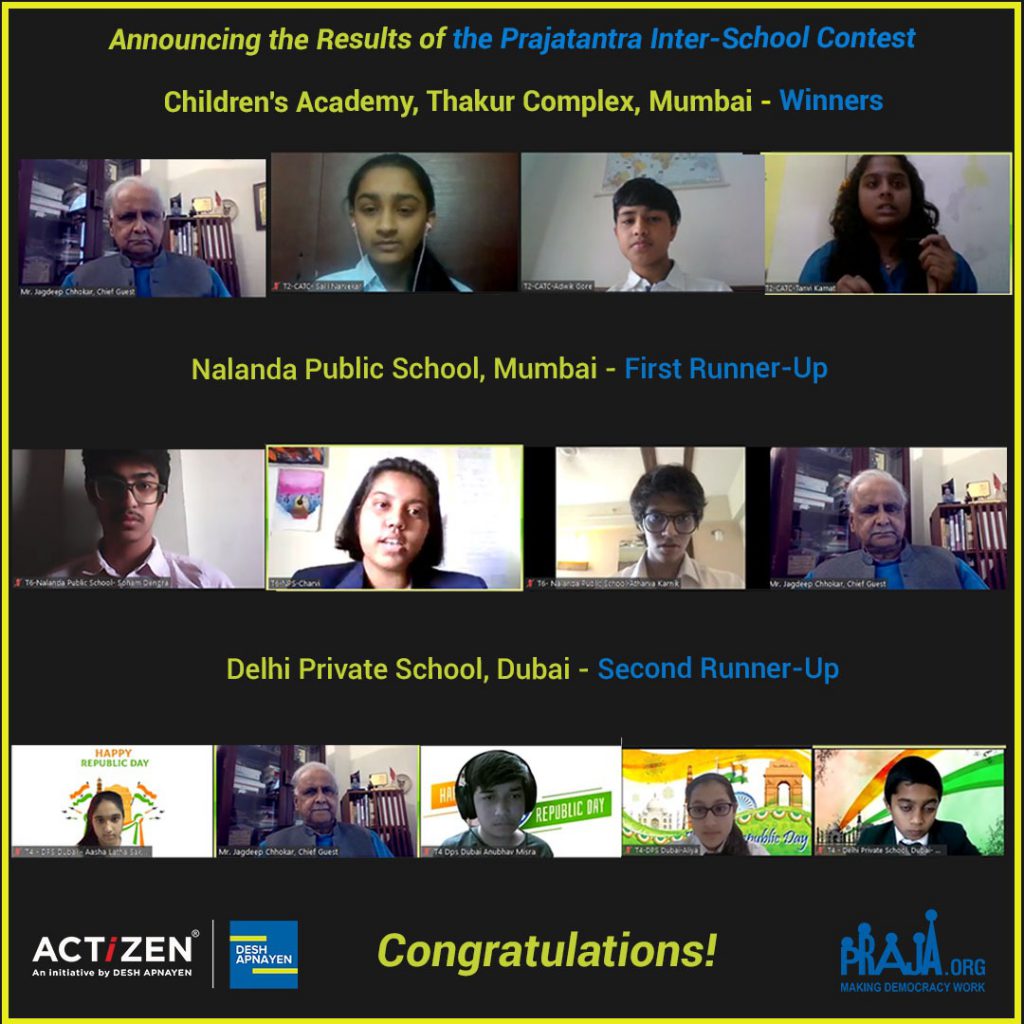January Week 4 Activity


“There cannot be daily democracy without daily citizenship.” – Ralph Nader
As India enters into the 72nd year of its constitutional republic on 26th January 2021, we need to recognise that the principles laid down in the Constitution and the democratic republic it sustains, are fruits borne out of the constant effort of its citizens (or ACTIZENS, as we at Desh Apnayen call them). With that in mind, Desh Apnayen and Praja Foundation presented ‘Prajatantra: An Inter-School Group Presentation Contest’. This initiative is part of Desh Apnayen’s efforts to engage students across India on certain Days of National and International Importance.
We hope this effort will create greater awareness on key issues among students, and help shape future leaders who become torchbearers of the ideals laid down by the Constitution of India.
The Grand Finale of the Contest was held on 29th January 2021 from 2 to 4 pm and streamed live at https://youtu.be/LRiqDXxtMxE We are honoured that Shri Jagdeep Chhokar, Co-Founder and Trustee, Association of Democratic Reforms and Director In-Charge, IIM Ahmedabad, joined us as the Chief Guest.
Shri Vallabh Bhanshali, Founder and Chief Mentor, Desh Apnayen and Shri Nitai Mehta, Founder and Managing Trustee, Praja Foundation also shared thought-provoking insights.
To share your thoughts on the initiative, you can leave a comment at https://www.facebook.com/events/165697344891025
For any queries, please write to info@deshapnayen.org or WhatsApp 8898890202 / 9029890291.
WINNERS OF THE PRAJATANTRA CONTEST
Heartiest congratulations to the winners of the Prajatantra Contest!
Winner – Children’s Academy, Thakur Complex, Mumbai
The winners of the contest were from Children’s Academy, Thakur Complex, Mumbai. The students from the winning team were Tanvi Kamat, Rahil Gandhi, Gouri Thakur, Palaash Jadav, Riya Godbole, Prapti Jani, Adwik Gore and Saili Narvekar led by teacher Jahnavi Sanghavi.
First Runner-Up – Nalanda Public School, Mulund, Mumbai
Nalanda Public School, Mulund, Mumbai bagged the first runner-up position. The team members were Atharva Karnik, Aakash Borji, Ameya Parab, Soham Dengra, Divya Gopalani, Advay Bapat, Soham Thorat and Charvi Yadhav led by teacher Neha Oza.
Second Runner-Up – Delhi Private School, Dubai
Delhi Private School, Dubai bagged the second runner-up position. The team members were Aliya Arora, Tanisha Kanagarajeu, Diva Rajpurohit, Sana Fathima, Aasha Latha Sakhamuri, Mikel Bonny, Anubhav Misra and Haard Ketankumar Bhut led by teacher Ashker M.
Winner of the Viewers’ Choice Award – DCM Presidency School, Ludhiana
We applaud the efforts of every single team that took part in the contest. Your desire and hard work to learn more about democracy and share your insights and knowledge with others are great ACTIZEN traits!
TEAMS QUALIFIED FOR THE GRAND FINALE
List of Teams Qualified for the Grand Finale on 29th January (In Alphabetical Order) :
- Children’s Academy, Ashok Nagar, Mumbai
- Children’s Academy, Thakur Complex, Mumbai
- DCM Presidency School, Ludhiana
- Delhi Private School, Dubai
- HVB Global Academy, Mumbai
- Nalanda Public School, Mumbai
- Navy Children School, Mumbai
Heartiest congratulations!
Contest Details
- There are no charges to take part in the contest or the online talk by Dr. Rupak Dattagupta on democracy.
- The last date to register is 20th January by 6 pm. (Registration Closed)
- Please note that only school principals or teachers can register their school team for the contest. Only one team per school can take part in the contest.
- The participating students can be from any of these grades – Class 6 to 10.
- As part of the contest, a team of eight students will be expected to put together a 7-minute PowerPoint (PPT) presentation that will be displayed during the Zonal Round, and a 5-minute one, if selected for the Grand Finale Round..
- As part of the presentation, students will compare India with two other democratic countries on certain parameters and share their analysis and insights.
- The names of the two countries that each school team will need to compare India with will be shared by email with the teacher and the student representative whose contact information is shared at the time of filling the registration form.
- Due to time constraints, we request only three students per school team to turn their camera on and speak during the allocated time of 7 minutes during the Zonal Round and 5 minutes, if selected for the Grand Finale Round.
- At the end of the presentation, the Chief Guest will ask a question to the team. Any one or two of the eight students from the team can respond to the question within 2 minutes.
- Time limit for each team during the Zonal Round – 7 minutes for the PPT presentation plus 2 minutes for the Chief Guest’s question for the team.
- Time limit for each team during the Grand Finale Round – 5 minutes for the PPT presentation plus 2 minutes for the Chief Guest’s question for the team.
- The Zonal Rounds will be held on Zoom on 23rd and 25th January. The teacher and student representative from each team will receive an email about the time slot that is blocked for them.
- The Grand Finale Round will be held on 29th January from 2 to 4 pm on Zoom. Only contest participants and mentor teachers can join on Zoom.
- We invite all others to watch the livestream of the Grand Finale on Desh Apnayen’s YouTube channel.
- The school teams will be judged by staff members of Desh Apnayen and Praja Foundation.
- Names of winning schools from the Zonal Rounds will be published on this webpage by 7 pm on 25th January. The short link to access this webpage is www.bit.ly/prajatantra
- E-certificates will be given to all participants of the contest as well as attendees of the Zonal and Grand Finale Rounds. Attendance certificates will also be sent by email to those who attend the online talk-cum-orientation session.
- A Viewers’ Choice Prize will be awarded to the school team that gets the maximum votes by SMS during the Grand Finale Round. The SMS number on which you can send your vote will be displayed on the screen on Zoom during the Grand Finale Round.
- The three teams judged to be the best during the Grand Finale Round will receive additional prizes.
Content to Display in the PPT During the Zonal Round
- Demography of the three countries including that of India (Population size, area, population density, cultural history related to the form of government that the three countries are practicing)
- Government structure (Legislative and Executive structure) and Judiciary in each of the three countries
- Fundamental rights and duties of citizens in each of the three countries
- Manner in which representation of people in government takes place in each of the three countries (For example: Reservations)
- Procedure of amendment in law or constitution in each of the three countries
- Role that democracy has played in affecting the economy in each of the three countries
- Role of citizens to make democracy work in India
Questions to Cover in Your Speech During the 7-Minute Presentation During the Zonal Round
- What do you think was the most significant effect of colonial rule in India?
- What is the best form of government structure from amongst the three countries your team researched and why?
- Do you think any of the fundamental rights or duties need to be amended in India? Explain why.
- Do you think there could be a better way for representation of people in Indian government? Explain how.
- Do you think the procedure of making constitutional amendments needs to change in India? Explain why.
- What role has democracy played in affecting the economy in India?
- How can citizens actively participate to make democracy work in India? You may use a case study from anywhere in the world to explain your ideas.
Evaluation Parameters
The parameters to evaluate the student teams during the Zonal and Grand Finale Rounds:
- The quality of analysis/research reflected in the answers to the first six questions
- The quality of PPT presentation and presentation skills
- The quality of answer given to the last question about how citizens can make democracy work in India
- The quality of answers given in response to the judge’s question at the end of the presentation
- Co-ordination amongst team members during the presentation and adherence to the time limit
About Desh Apnayen Sahayog Foundation
Desh Apnayen was founded by Shri Vallabh Bhanshali, Co-founder and Chairman of ENAM Securities, and his associates in 2015. Its vision is to co-create Democracy 2.0, by building an accountable citizenry and society around three important themes: citizenship education, volunteerism and neighbourhood engagement.
Schools that would like to start the Desh Apnayen ACTIZENS’ Club, take part in monthly activities, or access the ACTIZEN Education Content can write to info@deshapnayen.org or 8898890202. The programmes are offered at no cost to the schools.
About Praja Foundation
Praja is a non-partisan organisation working towards enabling accountable governance since 1997. It believes that urban governance in India has failed to deliver good governance to the citizens of urban India, and that this is due to the governance structure of urban India. It also believes that the lack of true grassroot democracy where local elected representatives and local governments are not sufficiently empowered and not responsive to the citizens is the primary cause for lack of effective governance in cities.
Praja undertakes data driven research for identifying capacities in urban governance, map inefficiencies in their work processes and identify best practices. It then provides this information to urban governance stakeholders including elected representatives, administration, citizens, media and academia; and works with leadership amongst its stakeholders to identify and address inefficiencies in building their capacities to improve work processes in urban governance.

